|
5-6 May:
The 5th was a holiday, Children's Day, so I went to the Ramie Festival
on the 5th and 6th.
They really treated me like gold. They had someone
pick me up at the bus station and drive me to the festival -- good thing, too, because it was far
enough away that a taxi would have cost a fortune. Then she guided me around all day. They bought
me dinner, my guide helped me check into a motel for the night, and met me the next
morning to show me around some more. Her boss bought us lunch, there was a special gift for
foreigners, and one of her colleagues drove me to the train station.
The festival was very nice. Of course I thoroughly enjoyed the demonstrations of how to make the
ramie cloth.
There were lots of other things to see, too. A potter was set up and had two wheels, and festival
attendees could try to make things. I tried, but I never could manage clay on a wheel, and I blew
it every time. But the potter rescued my piece and made it look like something. After it's fired,
she's going to mail it to me. There was supposed to be a 5,000 won (about US$4.50) charge
for the mailing, but because I'm a foreigner, she didn't charge me.
I could get really spoiled here. It'll be a letdown when I go home and I'm not special any more.
There were some older men demonstrating making shoes out of straw. Carrie, my guide, was
surprised when I said I'd like to try it, but she asked the men, and they were thrilled. I'm sure
it was an absolute hoot for them, seeing a western woman kick off her shoes to join them and
try it out. There was lots of laughing and cheering, especially when I really did spit on my hands
the way they showed me, and we all had a really good time.
So, I have about half of a straw shoe done. I'd like to get a hold of some more straw to practice,
but since I only know how to do the front half of a shoe, I'd have a hard time finishing it. There's
at least one person in Kangnung who makes straw shoes; maybe he'd be willing to show me.
There were traditional Korean games to try, some nice displays of ramie items, and a really good
fashion show at the end of the night, with modern and traditional
hanbok
all made of ramie. The designer for the fashion show, Lee Young-hee, has a shop in Paris. She's
also doing a fashion show at Carnegie Hall on the 30th of June.
The second day I was at the festival (the 6th), I saw a demonstration of the Korean version of
a "sheep to shawl" [an event in which participants shear a sheep, spin the wool, and weave
it into a shawl -- often in competition with other teams. -ed], with ramie of course. It normally
takes one woman 5 days to prepare and weave one length of ramie fabric, so they use a team of
five and it takes one day. It was a popular pastime 'way back when, and for purposes of the
festival, it was presented more as a procession and dance, and lasted 45 minutes or so.
The last thing I saw before I left was a clown show. I really could have skipped it, but Carrie
seemed to enjoy it. For everyone else there, it was a perfectly normal sort of thing -- clowns
dancing to taped music, bringing little kids on stage, and making ballon animals for them.
Unfortunately, the music they'd chosen was an American rap song about gangbanging and oral sex,
with very graphic lyrics. So where everyone else saw clowns, I saw perverts and child
molesters. One guy reminded me of the pimp in Miss Saigon. It was both sad and funny.
The trip home was an adventure. The guy who took over for Carrie swore up and down that I'd
be much better off going home by way of Suwon instead of Chonan, the way I came. On top
of that, he said the train would be much better than the bus.
I could see several potential pitfalls to this plan. Getting from the train station to the bus stop
was one, and the possibility that there might not be a bus from Suwon to Kangnung was another.
It seemed to me that if Suwon was really better, that's the way the people at the Tourist Office
would have suggested in the first place. But since this guy was also offering to drive me to
Kangnung (all the way across the country) if I would stay one more day, I took him up on his
suggestion. I figured the whole year is an adventure, so why not?
I'll admit, the train ride was much nicer than the bus ride had been. The seats were more
comfortable, the view was better, there was a restroom available, and vendors roamed the aisles,
selling food and drink.
The bus station in Suwan wasn't all that far from the train station, once I managed to find someone
who understood what I was asking. If I had understood the answer better, it would have been
even closer, and I wouldn't have had to walk through what I assume was the red light district
(scantily-clad women hanging out in doorways).
I made it to the bus station. I found my way inside after 3 tries, only to be told that I needed the
outside terminal for a ticket to Kangnung. So I went with plan B and took a bus to Seoul.
I got into Seoul just after the ticket offices closed.
That was something I hadn't anticipated -- I thought they'd be open until 11 or 12. So after
considering various possibilities, I asked an official-looking person if there were any buses
yet to Kangnung. He told me to ask another person, who went back and asked the first
person, and then told me to sit and wait. Then he took me to a different set of seats and
again told me to sit and wait. Then he took me outside where the buses were, and told
me to sit and wait.
Finally he called me onto a bus, and I paid my fare and took the last seat. I hoped it was going
to Kangnung (I seem to pronounce it wrong a lot of the time). Sure enough, a few hours later,
I was home.
Boy, I've written 5 pages on the ramie festival -- and that was the Reader's Digest condensed
version!
|  May 11th was a holiday,
The Buddha's Birthday.
Annie
and her parents took me to 3 different temples that day. There were lots of paper lanterns
hung in the temple yards, as symbols of the Buddhist's quest for enlightenment,
and a small gold Buddha statue surrounded with flowers. People that
were having bad luck could make an offering and pour a ladleful of water over the statue --
"washing the baby Buddha," Annie called it.
May 11th was a holiday,
The Buddha's Birthday.
Annie
and her parents took me to 3 different temples that day. There were lots of paper lanterns
hung in the temple yards, as symbols of the Buddhist's quest for enlightenment,
and a small gold Buddha statue surrounded with flowers. People that
were having bad luck could make an offering and pour a ladleful of water over the statue --
"washing the baby Buddha," Annie called it. Weddings are held in commercial wedding halls instead of churches or temples. Apparently they
aren't religious at all. My friend
Weddings are held in commercial wedding halls instead of churches or temples. Apparently they
aren't religious at all. My friend
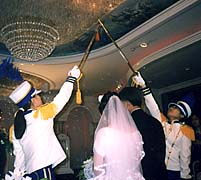 Finally it was time. First the mother of the bride and mother of the groom walked under the flower
arch and down the aisle hand in hand. At the altar they went to opposite sides, lit candles, and
sat down. Then dry ice fog started to appear in one corner of the room, and a glass box came out
of the wall with Christine and her fiance in it, and floated along the wall to the back of the room.
The groom marched under the arch and down the aisle to a military fanfare as the girls held their
swords at attention. Then came "Here Comes the Bride," and Christina and her father came down
the aisle. He left her at the altar and went to sit with her mother.
Finally it was time. First the mother of the bride and mother of the groom walked under the flower
arch and down the aisle hand in hand. At the altar they went to opposite sides, lit candles, and
sat down. Then dry ice fog started to appear in one corner of the room, and a glass box came out
of the wall with Christine and her fiance in it, and floated along the wall to the back of the room.
The groom marched under the arch and down the aisle to a military fanfare as the girls held their
swords at attention. Then came "Here Comes the Bride," and Christina and her father came down
the aisle. He left her at the altar and went to sit with her mother.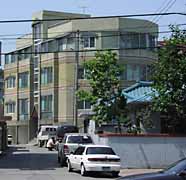
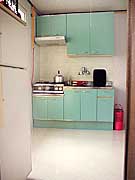
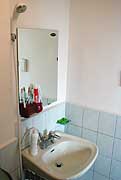
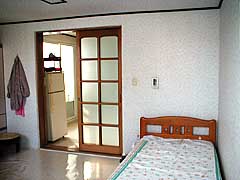
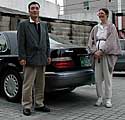 We really wasted most of our time in Kangnung. It was so nice to just be together, drinking tea and
hanging out, that most days we didn't get our acts together early enough to do anything before I had
to leave for work. We did get to
We really wasted most of our time in Kangnung. It was so nice to just be together, drinking tea and
hanging out, that most days we didn't get our acts together early enough to do anything before I had
to leave for work. We did get to
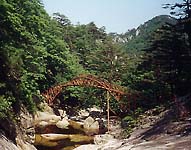 So anyhow, we went to Sogumgang, which she said
was in part of Odaesan Park. Not only was it in Odaesan Park, but it
turned out to be the same part of Odaesan Park that I've been to twice
already! I didn't mind though. It's a nice hike, we went further than I've
gone before, and it's a little different with each different person I go
with, because they tell me different things.
So anyhow, we went to Sogumgang, which she said
was in part of Odaesan Park. Not only was it in Odaesan Park, but it
turned out to be the same part of Odaesan Park that I've been to twice
already! I didn't mind though. It's a nice hike, we went further than I've
gone before, and it's a little different with each different person I go
with, because they tell me different things. 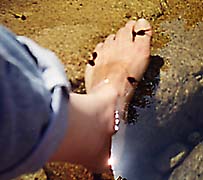 A little beyond the big rock we found some nice rocks in the
shade in the river by a quiet pool and had a picnic lunch of kimbab.
Along with the shade there was a nice
breeze, and we took off our shoes and cooled our feet in the pool of water
before we ate. The pool had lots of big fat tadpoles and some baby fish,
and a few underwater bugs that looked exactly like sticks. I didn't
realize they were bugs until they started walking. After lunch I tried to
feed some puffed rice cake to the fish, but they wouldn't eat it. I could
just hear the comments: "What's this, styrofoam? How about feeding us
something good, like bread, or worms!"
A little beyond the big rock we found some nice rocks in the
shade in the river by a quiet pool and had a picnic lunch of kimbab.
Along with the shade there was a nice
breeze, and we took off our shoes and cooled our feet in the pool of water
before we ate. The pool had lots of big fat tadpoles and some baby fish,
and a few underwater bugs that looked exactly like sticks. I didn't
realize they were bugs until they started walking. After lunch I tried to
feed some puffed rice cake to the fish, but they wouldn't eat it. I could
just hear the comments: "What's this, styrofoam? How about feeding us
something good, like bread, or worms!"